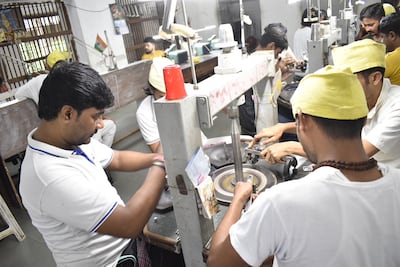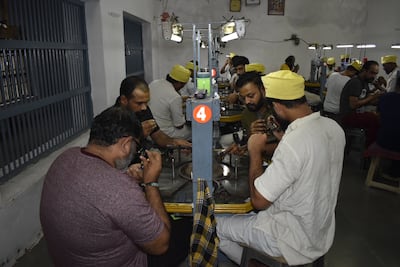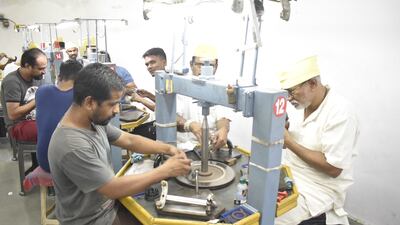Dozens of men are busy, working in teams of four at machines fitted on well-illuminated desks. While some are peering through handheld microscopes examining diamonds, others are polishing them.
The workers, whose ages range from their twenties to their fifties, are dressed in T-shirts and jeans, or trousers and baggy shirts with Nehru caps perched on their heads.
A factory scene? Not quite.
This is the Lajpore Central Jail in Surat, in the western Indian state of Gujarat, a site that trains hundreds of people detained for serious offences, including murder and burglary, the fine art of diamond polishing. The unique project, launched in 2017 in collaboration with local diamond manufacturers, has inmates polishing 25,000 to 30,000 stones every month for sale in the domestic market and export to the UAE, UK and the US.
“The prisoners have taken very well to this initiative. We have about 25 diamond-polishing machines currently running in the jail. At the end of each eight-hour shift, the diamonds are inspected, collected from all the desks and kept in the safe custody of the jail officials,” says J N Desai, superintendent at the jail.
superintendent, Lajpore Central Jail
To date, not a single diamond has gone missing from the jail. For their efforts, the prisoners are paid monthly – those acting as managers or supervisors get the maximum salary of $250, those in lower roles receive between $150 and $200. The workers are allowed to retain 10 per cent of the money for personal expenses in the jail, the rest is given to their families because most have spouses, children and parents to support, Mr Desai says.
He says that although the project was launched with a few prisoners, it proved so successful that soon more than 100 inmates were enrolled, with employees of a diamond company and other experts mentoring them. The project has literally set a shining example of prison reform and has also helped to promote Surat as a leading diamond polishing centre globally. Known as the Diamond City, the city supplies 95 per cent of the world’s polished rough diamonds, according to jail officials.

The initiative, one jail official says, is part of the prison’s overarching rehabilitation programme, which is aimed at empowering prisoners.
“We set out to develop inmates’ inherent skills, which not only improves their level of employability once they leave us, but also minimises their chances of falling back on a life of crime,” he says.
Lajpore Central Jail, which houses about 3,000 inmates, offers other vocational activities, such as textile weaving, furniture making and snack production. One inmate, who is a decade into a life sentence, says that crafting furniture at the jail has not only taught him a new skill but also improved his confidence. “The work has pulled me out of depression,” he says.
Another convict says diamond polishing has helped him set a positive example for his family. “My wife and kids were not proud of me when I was sentenced to a five-year term. But now, when I send money to them earned through my hard work in jail, they are happy and hopeful for our future.”
Jail reformation programmes are vital not only for the inmates’ mental health but also for their family members, experts say. According to a study by the UN, incarceration weakens social cohesion.
“When a member of a family is imprisoned, the disruption of the family structure affects relationships between spouses, as well as between parents and children, reshaping the family and community across generations,” the UN's website says on the subject of promoting prison reform.
Behavioural study expert Prabha Dwivedi says that because prison life is fraught with challenges, being incarcerated can cause trauma “leading to mental health disorders, a loss of self-worth, loneliness, uncertainty and fear”. In such a scenario, she says, an empathetic ecosystem in jails can be instrumental in not only helping the inmates reform themselves but also prepare them well for re-integration into society.

Lajpore Central Jail is taking steps to create a healthy environment for its inmates. A far cry from the dark Dickensian jails of the past, it features vast open spaces with lush foliage, cricket and football pitches, and volleyball and basketball courts, as well as a well-stocked library with 18,000 books on a range of topics – from history and mythology, to biographies and fiction.
“Apart from remunerative projects, we also encourage extracurricular activities among prisoners to improve their social and interpersonal skills. We host cricket and football matches between different jails, complete with cheering teams, etc. They are a lot of fun and the inmates love these sessions. Recently, we also held an exhibition of 130 paintings and artworks created by the inmates, which were sold out online in no time,” Mr Desai says.
The inmates also run a radio channel, Radio Prison, with segments on entertainment, news and employment. Newspaper headlines are read out, Bollywood songs played and motivational talks given to keep listeners hooked. “The whole idea is that a prisoner leaves a far better person than when he came in,” Mr Desai says.

